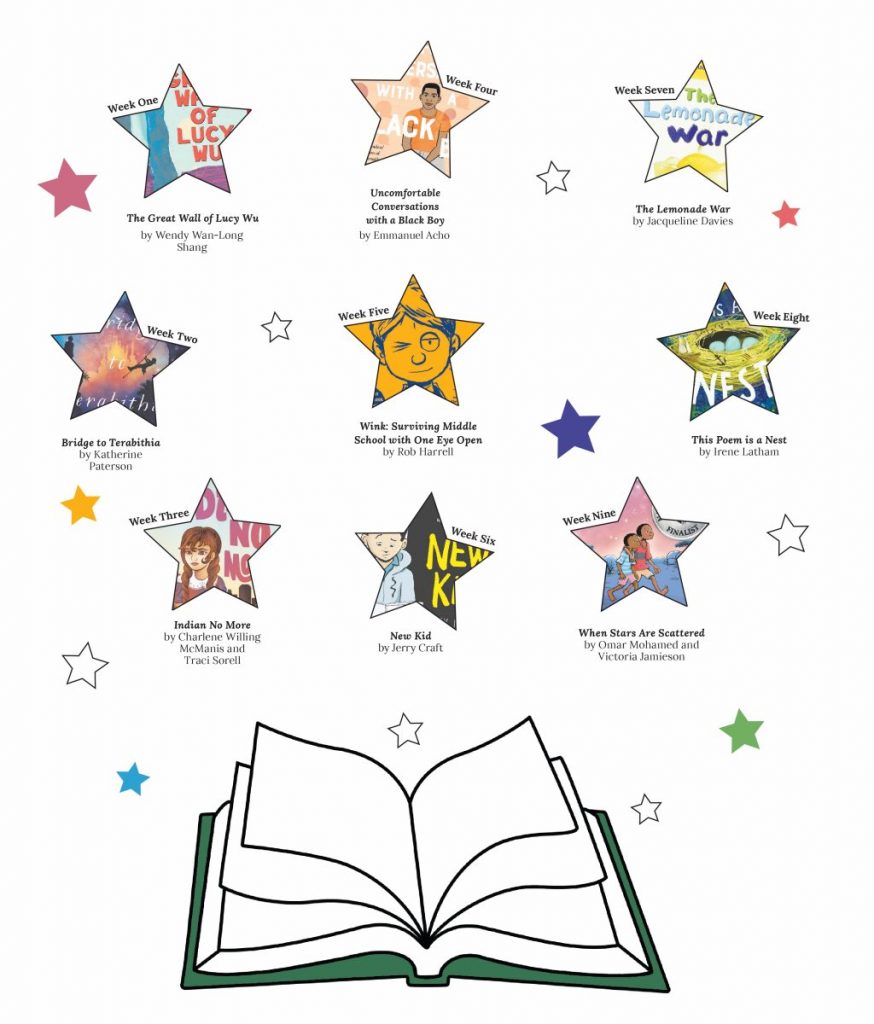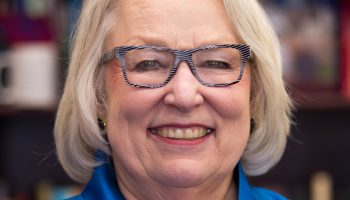SARAH VEST – STAFF WRITER

Anyone who has been to Chautauqua knows the culture of front porch discussions are as critical to the experience as the programming itself. This year the CLSC Young Readers program is all about creating opportunities for Chautauqua’s youth to have their own conversations.
“The idea was really to find books that fit the themes that are, of course, appropriate for our young readers, but books that can be challenging as well,” said Sony Ton-Aime, the Michael I. Rudell Director of the Literary Arts. “We were looking for books that would initiate conversations.”
This year, selecting the books was a team effort — something Ton-Aime said he found “exhilarating.” He was joined in the book selection process and program creation by Alyssa Porter, the director of youth and family programs, and Manager of Community Education Karen Schiavone — who also co-coordinates the Institution’s annual Battle of the Books for county fifth-graders
“We look at everything from reading level, to subject matter, to demographics — just to make sure that there’s something on that list for every kid,” Schiavone said.
Schiavone is looking forward to Week Two’s pick, Bridge to Terabithia, because it was one of her childhood favorites. She said the book ties into the theme of “New Frontiers: Exploring Today’s Unknowns” by focusing on themes of “innovation, imagination and progress.”
This year the main CLSC Young Readers program is going to be at 1 p.m. on Sundays on the Hultquist Center porch. There, kids will be able to participate in a book discussion designed for people that have either read the book or are just picking it up. The discussion will be followed by what Porter calls an “engagement activity.” These activities are hands-on crafts and art projects that have been inspired by that week’s book.
“Our first Sunday of the season there was a basketball cup and ball game that the kids created (for The Great Wall of Lucy Wu),” Porter said. “Our Play CHQ staff are primarily going to be running these activities, but Mark Wenzler, our new director of the Climate Change Initiative, is planning (Week Two’s).”
Play CHQ, new this year, is a series of pop-up activities that happen around Chautauqua’s grounds. They are meant for people of all ages and no registration is required to attend. Play CHQ, funded by the Elise M. Besthoff Charitable Foundation, invites families to explore together through games, crafts and STEM activities, Porter said.
If people are unable to attend the CLSC Young Readers activity on Sunday, grab-and-go kits will be available throughout the week in Smith Memorial Library. The discussion questions, as well as step-by-step directions for the week’s craft, will be available online through the CHQ Clubhouse Instagram and Facebook pages.
“While we target ages 9 to 14, it’s open to anyone — adults and younger kids,” Porter said. “Our goal is really to just instill a love of reading.”
The idea behind the discussion and activities is to not only engage Chautauqua’s youth, but to give them and their families the tools to have similar conversations like those happening around the morning and afternoon lectures.
“We really want it to be hands-on and interactive, because you’re not going to get kids engaged in reading or interested in a deeper dive into the material or content if you’re not getting them into the book — and you can’t do that if you’re just talking at them,” Schiavone said.
Ton-Aime is looking forward to Week Three’s book Indian No More not only because the book challenges the theme of “Trust, Society and Democracy,” but because for the first time, one of the CLSC Young Readers authors will be a part of the program.
“It’s what the CLSC Young Readers is about really, to encourage young readers to read but also to see what their futures hold as writers,” Ton-Aime said.
This year’s Young Readers lineup is particularly diverse. There are books written by Asian Americans, African Americans, refugees and people from the Umpqua nation.
“It’s like a mirror for the kids to see themselves, but also for the kids to be exposed to the diversity that is present in the United States,” Ton-Aime said, “for them to know the stories of other people and be more empathetic in their thinking and their ways of life.”




